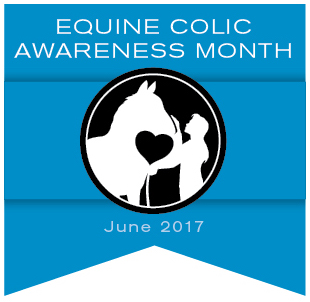Author: Lyndsey White
I was only 16-years-old when I lost my beloved Thoroughbred “Ben” to colic.
I had taken Ben out for a ride after school on a Friday evening. We hacked out down the bridleway to the recently ploughed stubble field where Ben loved to gallop. As we reached the field, Ben would normally start to get excited and pull forward in anticipation of being given the go-ahead to gallop. Not this time; something was very wrong. I had never known Ben to feel sluggish but he did that evening and didn’t even want to go forward. I immediately turned him around and headed back down the bridleway to the farm at which he was boarded.
When I got back to the farm I unsaddled Ben and put him in his stable after brushing him down. I sat watching him for a while and he just didn’t look right, but showed no signs of colic at that time. I headed the half-mile back home and decided to check on him later that evening.
I didn’t have the chance to make it back to him before I received a very worried phone call from the owner of the farm. “You had better come quick, your horse looks pretty ill”.
I raced with my Mum and Dad back to the farm and Mum called the vet as soon as we saw Ben. He was pawing the ground, getting up and down, and sweating profusely. We knew immediately it was colic.
Dad put a head collar on Ben and stood with him trying to calm him, stroking his neck and telling him everything would be ok and the vet was on the way. Ben was like a member of the family and both of my parents were visibly upset that he was in distress. My Mum was a rider as well but Dad had just grown to love the horses we had both owned over the years.
The vet arrived about a half hour later and confirmed the worst. It was indeed colic. He gave Ben some shots and started to ask if we had fed him anything outside of his normal feed. I said no and the vet asked if he had been turned out on the rich spring pasture out back and again the answer was no. We were very careful to restrict grazing on such lush pasture in the spring.
After two hours the vet said Ben seemed to be more comfortable, gave us instructions on what to do, and said he would be back in the morning at 10am unless we called him first. I decided to stay with Ben through the night and so Mum went home, fetched blankets for the two of us and Dad headed back to the house. We didn’t get much sleep as both of us were so worried about Ben.
About 4:30 am we had finally gone to sleep when we were awakened by Ben making noises of distress and trying to go down on the floor. Mum quickly stopped him doing this, as she was worried he wouldn’t get back up and told me to call the vet.
The vet arrived in what seemed like forever and immediately gave Ben another shot and then started to administer liquid paraffin as he deemed that Ben had an impaction and the gas build up from bacteria in the GI tract was making Ben’s abdomen distend. This continued for quite some time but it didn’t appear to be doing any good and Ben’s condition continued to deteriorate. I asked if could be taken in for surgery but the vet said he would not likely survive the 45 minute horse trailer drive to the clinic and he called for another vet to come to the farm. By the time the second senior vet arrived (who was a surgeon) from another emergency call, Ben had blown up like a balloon with all of the gas build up and I could see this was now a really bad situation. We couldn’t believe how quickly Ben had deteriorated.
The second vet immediately said “we have to operate if he stands a chance.” There was a frenzy to prep the area and get surgery started. They didn’t get the chance to perform surgery as before they could Ben started thrashing and went down. The second vet looked at me and I started to cry.
He said “you have to do the right thing, he is in pain and I don’t believe he would even survive surgery.” My Mum made me leave the stable and they put my beloved horse to sleep.
We later found out that the next door neighbor of the farm (who was not a horse person) had cut the grass on the day I first noticed something was amiss with Ben. They had noticed Ben started by the gate of the paddock and thought he looked hungry, so had tipped all of the grass clippings from the lawn into his paddock over the fence. Ben had promptly gorged himself on the grass clippings, which caused him to suffer an impaction and explained the extreme bloating of his abdomen.
Losing Ben made me learn a very valuable lesson, to post a “do not feed anything to the horses” sign on the gate and on the fences around the paddock as you never know who just might feed something to your horse.






